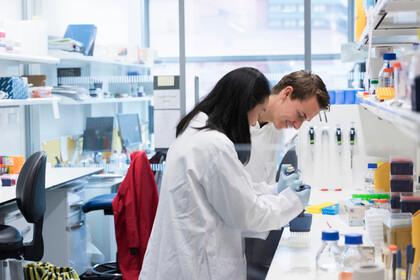
Researchers take first steps to creating synthetic human genomes
A team of UK-based scientists are developing technology to create the first synthetic human chromosome. The ability to write large genomes has the potential to transform our understanding of human health, opening opportunities to develop cell therapies, climate-resistant crops and more.

Wellcome
Ever since the completion of the Human Genome Project in 2003, researchers have been investigating the possibility of writing genomes. Now, scientists are developing the technology to make it possible.
Wellcome is providing £10 million funding to the new Synthetic Human Genome Project (SynHG) to develop the foundational tools, technology and methods to enable researchers to one day synthesise genomes.
Building a full synthetic human genome is expected to take decades. Over the next five years, the SynHG project will build the foundational tools to enable this work.
While this is a huge challenge, the potential benefits are profound. A fully synthetic human genome – and the research to create it – would transform our understanding of health and disease.
It could one day lead to new medical treatments, like designer cell-based therapies and virus-resistant tissue transplantation. It could also help us defend biodiversity and food security, such as by engineering plant species to withstand climate extremes.
Unlike genome editing, genome synthesis allows for changes at a larger scale, and to determine causal relationships between DNA and human characteristics.
“Our DNA determines who we are and how our bodies work,” says Michael Dunn, Director of Discovery Research at Wellcome. “With recent technological advances, the SynHG project is at the forefront of one of the most exciting areas of scientific research.”
“Through creating the necessary tools and methods to synthesise a human genome, we will answer questions about our health and disease that we cannot even anticipate yet, in turn transforming our understanding of life and wellbeing.”
What will it take to synthesise a human genome?
In the next five to ten years, the SynHG team aim to build a full synthetic human chromosome. This is an ambitious goal in itself, which will require the team to overcome many separate scientific challenges. Synthesising a human genome will be an even greater challenge.
The ambition can be compared to the first draft of the Human Genome Project, which took years and significant resource to develop. Once the concept is proven, technology can advance relatively quickly.
The project is led by Professor Jason Chin from the Generative Biology Institute at Ellison Institute of Technology and the University of Oxford, in collaboration with a team of researchers from Cambridge, Kent, Manchester, Oxford and Imperial College London.
“The ability to synthesize large genomes, including genomes for human cells, may transform our understanding of genome biology and profoundly alter the horizons of biotechnology and medicine,” says Professor Chin.
"With SynHG, we are building the tools to make large genome synthesis a reality. At the same time, we are proactively engaging in the social, ethical, economic and policy questions that may arise as the tools and technologies advance. We hope that Wellcome’s support for this combination of approaches will help facilitate substantive societal benefit.”
Ethics and public engagement are central to synthetic genomics
Synthetic genomics is both technically and ethically complex. To ensure these new tools will benefit society, the SynHG project embeds a social science programme alongside scientific development. It will work with academic, civil society, industry and policy partners around the world to examine the ethical, legal and social implications.
The social science programme, named Care-full Synthesis, is led by Professor Joy Zhang from the Centre for Global Science and Epistemic Justice at the University of Kent.
“With Care-full Synthesis, through empirical studies across Europe, Asia-Pacific, Africa, and the Americas, we aim to establish a new paradigm for accountable scientific and innovative practices in the global age,” says Professor Zhang. “One that explores the full potential of synthesising technical possibilities and diverse socio-ethical perspectives with care.”
Among other aspects, Care-full Synthesis will consider:
- different societal priorities and perceptions about large genome synthesis research around the world
- how to include diverse perspectives in knowledge production
- how new knowledge can be shared responsibly and fairly
- policy requirements to ensure the research can be applied effectively and respectfully for different regions and communities, if and when desired
Current genomic research is skewed towards those with European ancestry. For this science to benefit everyone, the needs and perspectives of diverse populations must be included in genomic research.
As technologies develop, the team will engage with people from a range of sectors, communities and geographies, as well as regulatory bodies and policy makers. Together, they will explore how to turn scientific possibilities into benefits for society.
Wellcome supports bold and creative discovery research that has the potential to improve human life, health and wellbeing.
We have three recurring funding awards:
Explore our one-off funding awards:

